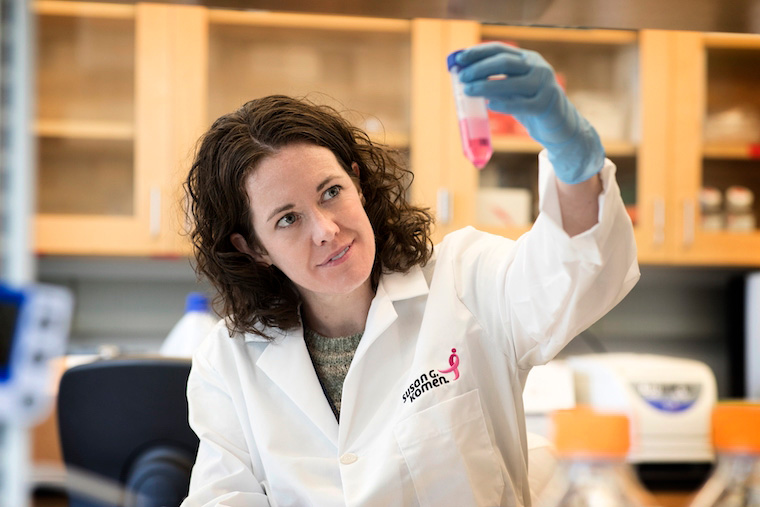
Groundbreaking animal-model research from the University of Virginia Cancer Center shows how an unhealthy, inflamed gut causes hormone receptor-positive breast cancer to metastasize more quickly.
“When we disrupted the microbiome’s equilibrium in mice using antibiotics, it resulted in low-level inflammation in the mammary tissue. Dysbiosis increased the susceptibility to tumor metastasis. In this inflamed environment, when a tumor was present, tumor cells were much more able to disseminate to the lungs,” says Melanie Rutkowski, PhD, a research faculty member in UVA’s Department of Microbiology, Immunology and Cancer Biology.
How Does an Unhealthy Gut Microbiome Fuel Breast Cancer?
Predicting whether HR+ breast cancers will metastasize is a major challenge within the field and primarily driven by clinical characteristics at the time of diagnosis.
“Early metastasis is affected by a variety of factors, including having increased inflammation in the tissue,” Rutkowski says. “Studies have also demonstrated that increased amounts of collagen in the breast tissue and tumor also lead to increased breast tumor metastasis.”
In Rutkowski's study, she found that the imbalanced, inflammatory microbiome caused tissue inflammation that increased the amount of collagen in breast tissue. The effect was powerful and sustained.
Her conclusion? “These findings suggest that having an unhealthy microbiome — and the changes that occur in the tissue in response to an unhealthy microbiome — may be early predictors of metastatic breast cancer. Based upon these findings, we would speculate that an unhealthy microbiome contributes to a higher incidence of metastatic disease.”
More Research Needed on Antibiotic Usage & Cancer Outcomes
While Rutkowski used powerful antibiotics to disrupt the mice’s natural gut bacteria, she emphasizes that antibiotics should not be avoided by women with breast cancer or anyone who needs them to treat infections.
For this study, the antibiotics were a simple way to create a long-term imbalance to the microbiome — similar to what individuals may experience with chronically unhealthy microbiomes. The effect was far, far more exaggerated than would occur in a person taking a normal course of antibiotics, or even multiple rounds, Rutkowski notes.
Substantially more research needs to be done to define whether an association exists between chronic antibiotic usage and cancer outcomes.
Manipulating the Microbiome May Benefit Future Patients
Thanks in part to Rutkowski’s research, doctors eventually may be able to manipulate the gut flora to benefit patients at high risk for or currently diagnosed with breast cancer. But the key message for now, Rutkowski says, is the importance of a healthy microbiome. The finding adds to the growing evidence demonstrating that a balance of microorganisms in the gut is vital for many aspects of good health.
UVA Findings Published in Cancer Research Journal
The researchers published their findings in the journal Cancer Research. In addition to Rutkowski, the study’s authors are Claire Buchta Rosean, Raegan R. Bostic, Joshua C.M. Ferey, Tzu-Yu Feng, Francesca N. Azar, Kenneth S. Tung, Mikhail G. Dozmorov, Ekaterina Smirnova, and Paula D. Bos.
The research was supported by a Susan G. Komen grant.